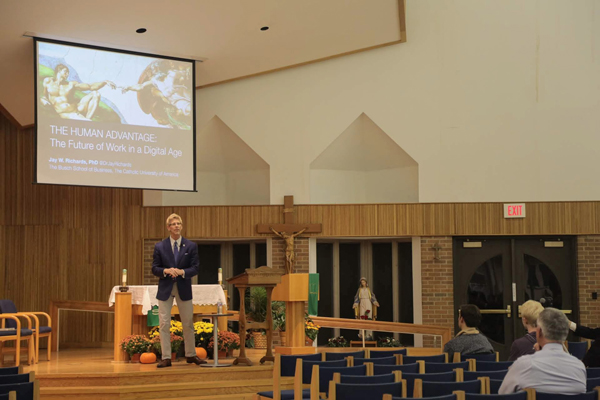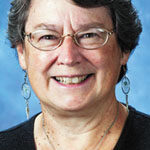
Jay Richards, author of “The Human Advantage: The Future of American Work in an Age of Smart Machines,” spoke at the University of Iowa Newman Catholic Student Center on Oct. 23. The event was hosted by the Dr. Rossi Center of Faith and Culture.
By Elizabeth Starr
For The Catholic Messenger
IOWA CITY —Jay Richards, author of “The Human Advantage: The Future of American Work in an Age of Smart Machines,” assured an Iowa City audience that humans will never be replaced by machines.
The business professor at Catholic University of America spoke Oct. 23 at the University of Iowa Newman Catholic Student Center to a group of students and community members. Richards is also a Third Order Dominican.
The event was hosted by the Dr. Rossi Center of Faith and Culture, which was established in 2017 to bring in speakers from across the United States, according to the center’s fellow, Gabrielle Greco.
Richard’s talk covered different arguments regarding the future of work and technology. One argument is dystopian, in which robots completely take over work and leave humanity in “technological unemployment.” Another is utopian, which states that humans will benefit greatly from not having to work because robots will do the work for them. “Both views are dystopian,” Richards says. “Work is part of what it means to be human.”
While the book was written for a secular audience, Richards focused his Iowa City talk on those practicing the Catholic faith and, most importantly, students. To avoid being replaced by machines, humans must not train to hone new skills to compete with the machines but instead cultivate virtues given by God that make each person unique, he said. These virtues:
• Courage: the willingness to act with the possibility of failure.
• Antifragility: something that is built stronger when it is stressed.
“Antifragility combined with courage,” Richards said, “shows that failure itself is not the path to success. We must act despite the possibility of failure and allow that failure to help us grow.”
• Altruism: acting for the benefit of the other, anticipating and providing needs.
• Collaboration: a form of humility, working with others to accomplish goals.
“People skills get jobs,” Richards explained to the students, “especially when involving global networking.”
• Creative freedom: this is not the freedom of choice (indifference) but rather the freedom of control and transformation over actions, the freedom of discipline.
Father Jeff Belger, vocational director at the Newman Catholic Student Center, said that what struck him the most from the talk was the idea of continual education. “It’s not just about going to a four-year college,” he said. “The idea behind using courage and antifragility to succeed is not trial and error, but trial and transformation. This is something that people can continue to learn and grow in throughout their life.”
“Man is the Homo Faber,” Richards said. “Man is the maker of machines. We should not demote ourselves to them or fear them. The creativity of these machines are an extension of the creativity given to us by God.”
The talk “was packed with info, but the info he gave us was really concrete and made a lot of sense,” said Greco, a senior studying history and pre-law at the University of Iowa. “He taught us that work is something instituted by God when he made us. It’s part of our essential being; it is what makes us human.
“The main idea I got from it,” Greco continued, “is to not get weighed down with the routine of work, and to find the meaning behind the work I do.”











